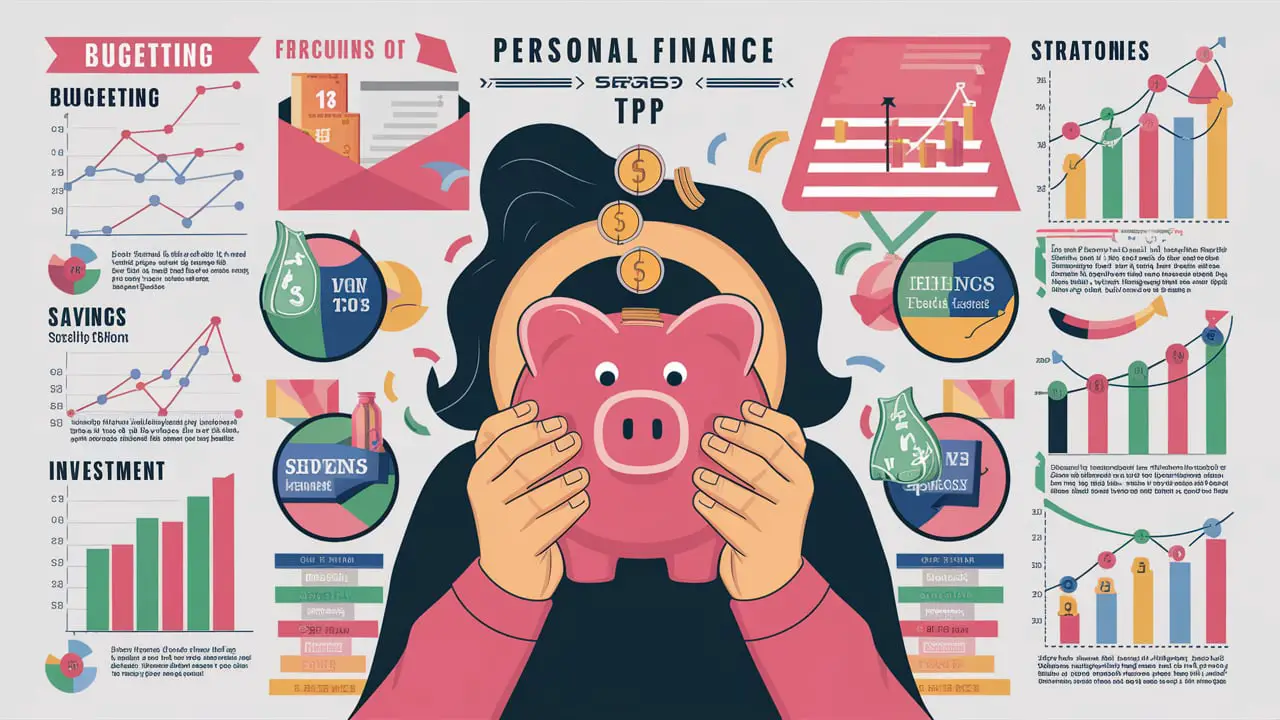Introduction : Personal Finance Tips
Managing personal finance is crucial for achieving financial stability and reaching your long-term financial goals. It encompasses budgeting, saving, investing, managing debt, planning for retirement, and much more. Understanding and implementing effective personal finance strategies can lead to a more secure and prosperous future.
Budgeting
Creating a Budget
Creating a budget is the foundation of personal finance. It involves tracking your income and expenses to ensure you are living within your means. Start by listing all sources of income, such as your salary, bonuses, and any side gigs. Next, categorize your expenses into fixed (rent, utilities) and variable (groceries, entertainment) categories.
Tracking Expenses
Consistently tracking your expenses is key to sticking to your budget. Use tools like spreadsheets, budgeting apps, or even a simple notebook to record every expense. Review your spending regularly to identify areas where you can cut back and save more.
Adjusting Your Budget
Your budget should be flexible. Life changes, such as a new job or an unexpected expense, may require adjustments. Regularly review and adjust your budget to reflect your current financial situation and goals.
Saving
Importance of Saving
Saving money is essential for financial security. It provides a cushion for emergencies, helps you reach financial goals, and ensures you have funds for future needs. Aim to save a portion of your income regularly, no matter how small.
Types of Savings Accounts
There are various types of savings accounts, each with its benefits. Regular savings accounts offer easy access to your money, while high-yield savings accounts provide better interest rates. Consider other options like money market accounts and certificates of deposit (CDs) for higher returns.
Emergency Fund
An emergency fund is a critical part of saving. It should cover three to six months’ worth of living expenses. This fund provides a financial safety net in case of unexpected events like job loss or medical emergencies.
Investing
Introduction to Investing
Investing is a way to grow your money over time. It involves putting your money into assets like stocks, bonds, mutual funds, or real estate with the expectation of earning a return. Investing can help you achieve long-term financial goals such as retirement or buying a home.
Types of Investments
There are several types of investments to consider:
- Stocks: Shares in a company that can provide high returns but come with higher risk.
- Bonds: Loans to a government or corporation that pay interest over time with lower risk.
- Mutual Funds: Pooled funds from multiple investors to buy a diversified portfolio of stocks and bonds.
- Real Estate: Property investments that can generate rental income and appreciate in value.
Risk and Return
Understanding the relationship between risk and return is crucial in investing. Higher potential returns usually come with higher risk. Diversifying your investments can help manage risk and achieve a balanced portfolio.
Debt Management
Types of Debt
Debt can be classified into good debt and bad debt. Good debt, like a mortgage or student loan, can help you build assets and improve your future earnings. Bad debt, such as high-interest credit card debt, can quickly become unmanageable.
Strategies for Paying Off Debt
Effective debt management involves prioritizing high-interest debt first. Strategies like the debt snowball (paying off the smallest debt first) or debt avalanche (paying off the highest interest debt first) can help you become debt-free faster.
Avoiding Debt Traps
Avoiding new debt is as important as paying off existing debt. Live within your means, use credit wisely, and avoid high-interest loans. Building an emergency fund can prevent you from relying on credit in emergencies.
Credit Score
Understanding Credit Scores
Your credit score is a numerical representation of your creditworthiness. It affects your ability to get loans, credit cards, and even housing. Factors influencing your credit score include payment history, credit utilization, length of credit history, and types of credit.
How to Improve Your Credit Score
Improving your credit score involves paying bills on time, reducing debt, and keeping credit card balances low. Regularly check your credit report for errors and dispute any inaccuracies.
Monitoring Your Credit Report
Regularly monitoring your credit report helps you stay on top of your credit health. You can get a free credit report annually from each of the three major credit bureaus: Equifax, Experian, and TransUnion. Look for discrepancies and take steps to correct them.
Retirement Planning
Importance of Retirement Planning
Retirement planning ensures you have enough money to live comfortably after you stop working. Starting early allows your investments to grow over time, benefiting from compounding interest.
Types of Retirement Accounts
Common retirement accounts include 401(k)s, IRAs (Traditional and Roth), and pension plans. Each has different tax advantages and contribution limits. Understanding these can help you choose the best options for your retirement savings.
Strategies for Retirement Saving
Maximize contributions to your retirement accounts, especially if your employer offers a match. Diversify your investments to balance risk and return, and adjust your savings rate as your income and expenses change over time.
Insurance
Types of Insurance
Insurance is essential for managing risk and protecting your financial well-being. Common types of insurance include health, life, auto, home, and disability insurance. Each serves a different purpose and provides coverage for various risks.
Choosing the Right Insurance
Choosing the right insurance involves evaluating your needs and comparing policies. Consider factors like coverage limits, premiums, deductibles, and exclusions. It’s essential to read the fine print and understand what is and isn’t covered.
Importance of Having Insurance
Having adequate insurance coverage is crucial for financial stability. It protects you from significant financial losses due to unforeseen events like accidents, illness, or natural disasters.
Tax Planning
Basics of Tax Planning
Tax planning involves managing your finances to maximize tax benefits and minimize liabilities. It includes understanding your tax bracket, deductions, credits, and other tax-saving strategies.
Tax-Advantaged Accounts
Utilize tax-advantaged accounts like 401(k)s, IRAs, Health Savings Accounts (HSAs), and 529 college savings plans. Contributions to these accounts can reduce your taxable income and grow tax-free or tax-deferred.
Strategies to Minimize Taxes
Strategies to minimize taxes include maximizing deductions, taking advantage of tax credits, and timing your income and expenses. Consult with a tax professional to develop a personalized tax strategy.
Financial Goals
Setting Financial Goals
Setting clear financial goals gives you direction and motivation. Goals can be short-term (saving for a vacation) or long-term (retirement). Write down your goals and create a plan to achieve them.
Short-Term vs Long-Term Goals
Short-term goals are achievable within a year, while long-term goals take several years to accomplish. Prioritize your goals based on importance and time frame, and allocate resources accordingly.
Tracking Progress
Regularly review and track your progress towards your financial goals. Adjust your plan as needed to stay on track and achieve your objectives














